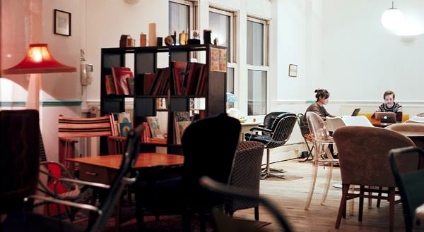It seems the London cafe scene is no stranger to headline-grabbing ideas. Lady Dinah’s Cat Emporium, the first ‘cat cafe’ in London where customers can enjoy the company of resident felines, has enjoyed high-profile media and newspaper coverage thanks to its niche angle. And although yet to open, the idea certainly has legs.
Now another London cafe has caught our attention, but it’s got nothing to do with cats. Ziferblat, a London-based Russian cafe, is doing an efficient job of tapping into the coworking trend in a rather unique way.
Ziferblat is a cafe-cum-workspace that offers free drinks and nibbles to punters. Sounds a little odd for a cafe – especially one with almost a dozen other locations to its name. The twist? Rather than charging for food and drink, Ziferblat charges for time.
Workers welcome
This is a novel approach for a coffee shop, and not just because the coffee is free. And not just because it’s cheap either. At just 3 pence per minute, guests can come and while away an hour for the incredibly low cost of £1.80 (approx $3.00), inclusive of a seemingly unlimited supply of drinks and nibbles.
It’s staggeringly cheap – particularly in London, the world’s most expensive place to rent office space. But the really interesting point is that, unlike many other cafes and big-name chains, Ziferblat actually encourages workers to settle down with their laptops and mobile devices.
As we explored recently on OfficingToday, today’s mobile workers are becoming less welcome in cafes and coffee shops. But despite the best efforts of some cafes to minimalise the amount of time workers sit and use the Wi-Fi, nursing the dregs of an hour-old latte, laptop-wielding workers continue to enjoy the buzz and bustle (and free Wi-Fi) of local cafes.
Now it seems that Ziferblat has found a way to capitalise on that trend. Rather than turning workers away or hiding the plug sockets, they are welcomed with free drinks and snacks. And in an establishment that charges by the minute, it makes sense.
Micro-tenants
So what exactly is Ziferblat? It’s not a ‘classic’ coworking space. It’s not even a cafe. It’s a “social experiment” – described as such on its own website, where each guest “becomes a sort of micro-tenant of the space, responsible for it and able to influence its life”. According to the website, Ziferblat is “first and foremost a social project, and not a business model.”
It’s a niche concept and, just like Lady Dinah’s Cat Emporium, that’s its marketing prowess.
The Ziferblat concept is worlds away from business centres. Or is it? These two worlds are in fact subtly linked through the all-encompassing market of flexible workspace. Take the Regus Businessworld model, for instance, where members can drop in to Regus business lounges to pause between meetings, use the Wi-Fi and enjoy hot drinks. At Ziferblat, you’ll also get a place to land, workspace and drinks – albeit with a significantly different culture and cost structure.
As Ray Lindenberg, President of Workspace Association of New York explains, Ziferblat’s by-the-minute model can indeed be aligned to the flexible workspace market.
“We’re just seeing the leading edges of the ‘Rentable-By-The-Minute’, flexible, touchdown workspace model – which makes a heckuva lot of sense in our increasingly on-the-go, thrift-manic, Work Anywhere universe,” he said. “When will we start seeing ‘Rentable-By-The-Minute’ Touchdown workspaces rolled out and be offered to an eager, larger market by wise, attentive, fresh-thinking entrepreneurs? Any minute – it’s a matter of time.”
Niche opportunities
As for Ziferblat, don’t expect this social experiment to steal your business centre clients just yet, but consider the marketing angle. What’s your niche? And taking the idea further, is there a way in which flexible workspace could work on a ‘free’ concept – and remain profitable?
Ray added: “Form always follows function. We live in an ever-evolving, Darwinist business world where, if a practice is valuable, some sharpie will figure out a way to make it accessible to the masses and monetize it. In the late 90’s, who would have envisioned that cars could be rented by the hour, a la ZipCar?”
Ziferblat started out purely by voluntary donations, and incredibly, the founders claim it never struggled financially. Only now is a slightly more formal system coming into play which charges for time. But even that was the result of a joke.
Coworking and touchdown spaces are each special and unique in their own right and this workspace movement is exactly that – a moving, malleable model that shifts and changes depending on demand. Ziferblat exists as a prime example of how a niche concept and a novel approach can generate results, even against the odds.
Should business centres spend less time focusing on square footage, and place more emphasis on clock-watching? Or perhaps we’re missing the point entirely. Could we see a new breed of future workspace where even clock-watching is out, and trust and voluntary donations are in? It might seem light years away. But a social experiment without a business model is proving that the old adage, ‘time is money’, is indeed worth its weight in gold.
Image source: Ziferblat London, Facebook



 Dr. Gleb Tsipursky – The Office Whisperer
Dr. Gleb Tsipursky – The Office Whisperer Nirit Cohen – WorkFutures
Nirit Cohen – WorkFutures Angela Howard – Culture Expert
Angela Howard – Culture Expert Drew Jones – Design & Innovation
Drew Jones – Design & Innovation Jonathan Price – CRE & Flex Expert
Jonathan Price – CRE & Flex Expert












